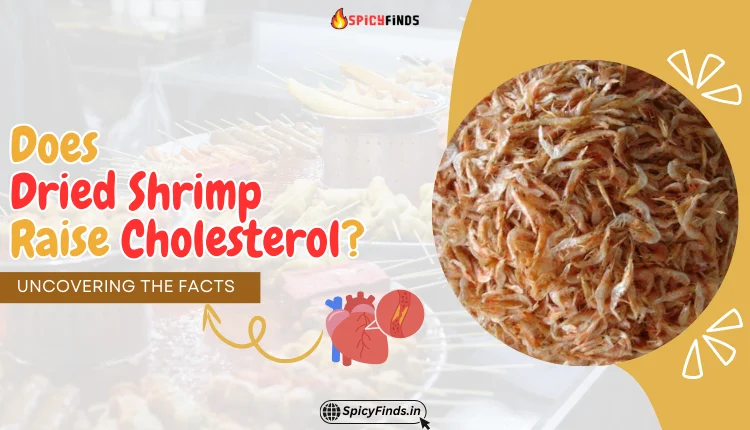- Your cart is empty
- Continue shopping

Dried shrimp is a popular ingredient in many cuisines, known for its intense flavor and versatility. However, many people wonder about its nutritional value, especially when it comes to cholesterol. Let’s dive into the facts about dried shrimp and cholesterol, and explore whether it’s a healthy choice for your diet.
Cholesterol Content in Dried Shrimp
Dried shrimp does contain cholesterol, but the amount might surprise you. A 2-tablespoon serving (about 15 grams) of dried shrimp contains approximately 40 calories and 126 mg of cholesterol. While this may seem high, it’s important to understand that dietary cholesterol doesn’t affect blood cholesterol levels as much as once thought.
In fact, recent research has shed new light on this topic. According to a report from InsideTracker.com, while shellfish like shrimp and squid contain higher levels of cholesterol than many other foods, research shows that consuming shrimp does not directly raise cholesterol levels in blood plasma. Similarly, MedicalNewsToday.com report states that although shrimp is high in cholesterol, it provides essential nutrients and may even support heart and cardiovascular health, making it a beneficial addition to a balanced diet.
Comparing Dried Shrimp to Other Foods
To put things in perspective, let’s compare dried shrimp to other common foods:
- Chicken (100g): 107 mg cholesterol
- Egg (1 large): 186 mg cholesterol
- Dried shrimp (100g): 840 mg cholesterol
While dried shrimp does have more cholesterol per gram than chicken or eggs, it’s typically consumed in smaller quantities.
Is Dried Shrimp Healthy to Eat?
Despite its cholesterol content, dried shrimp offers several health benefits:
- High in Protein: Dried shrimp is an excellent source of protein, which is essential for muscle growth and repair.
- Low in Saturated Fat: Unlike many other high-cholesterol foods, dried shrimp is very low in saturated fat, which is more harmful to heart health than dietary cholesterol.
- Rich in Nutrients: Dried shrimp contains important vitamins and minerals like calcium, iron, zinc, and vitamin B12.
- Omega-3 Fatty Acids: While not as high as in fatty fish, dried shrimp does contain some omega-3s, which are beneficial for heart and brain health.
Is Dried Shrimp or Chicken Better for High Cholesterol?
When comparing dried shrimp to chicken for people with high cholesterol:
- Cholesterol Content: Chicken has less cholesterol per gram than dried shrimp.
- Saturated Fat: Chicken has more saturated fat than dried shrimp, which can be more problematic for cholesterol levels.
- Portion Size: Typically, people eat smaller portions of dried shrimp compared to chicken.
- Nutritional Profile: Both offer different nutrients, so including both in your diet (in moderation) can be beneficial.
The choice between dried shrimp and chicken depends on your overall diet, portion sizes, and how they’re prepared.
Other Common Questions About Dried Shrimp
How Does Drying Affect Shrimp’s Nutritional Value?
Drying concentrates the nutrients in shrimp, including protein and minerals. However, it may also lead to some loss of heat-sensitive vitamins.
Can I Eat Dried Shrimp if My Cholesterol is High?
If you have high cholesterol, you don’t necessarily need to avoid dried shrimp entirely. Here’s why:
If you have high cholesterol, you don’t necessarily need to avoid dried shrimp entirely. Here’s why:
- Dietary Cholesterol vs. Blood Cholesterol: Research shows that the cholesterol we eat doesn’t significantly impact blood cholesterol levels for most people.
- HDL Cholesterol Boost: Some studies suggest that shrimp consumption may increase HDL (good) cholesterol more than it increases LDL (bad) cholesterol.
- Low Saturated Fat: Dried shrimp is very low in saturated fat, which is more influential in raising blood cholesterol than dietary cholesterol.
However, if you have been advised by your doctor to limit cholesterol intake, you should follow their guidance and consume dried shrimp in moderation.
Are There Any Risks Associated with Eating Dried Shrimp?
While generally safe, some considerations include:
- Sodium Content: Dried shrimp can be high in sodium, which may be a concern for those with high blood pressure.
- Allergies: People with shellfish allergies should avoid dried shrimp.
- Mercury: Like other seafood, shrimp may contain trace amounts of mercury, though levels are typically low.
While dried shrimp does contain cholesterol, it can still be part of a healthy diet when consumed in moderation. Its high protein content, low saturated fat, and rich nutrient profile make it a valuable ingredient. For most people, the benefits of including dried shrimp in their diet outweigh the concerns about its cholesterol content.
Remember, a balanced diet is key. If you enjoy dried shrimp or dried baby shrimp, there’s no need to eliminate it completely, even if you’re watching your cholesterol. As always, if you have specific health concerns, it’s best to consult with a healthcare professional or registered dietitian for personalized advice.
